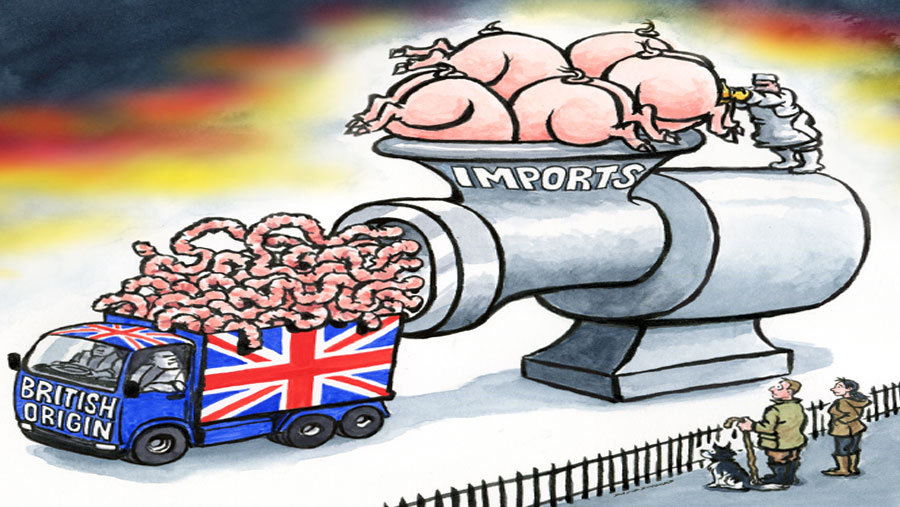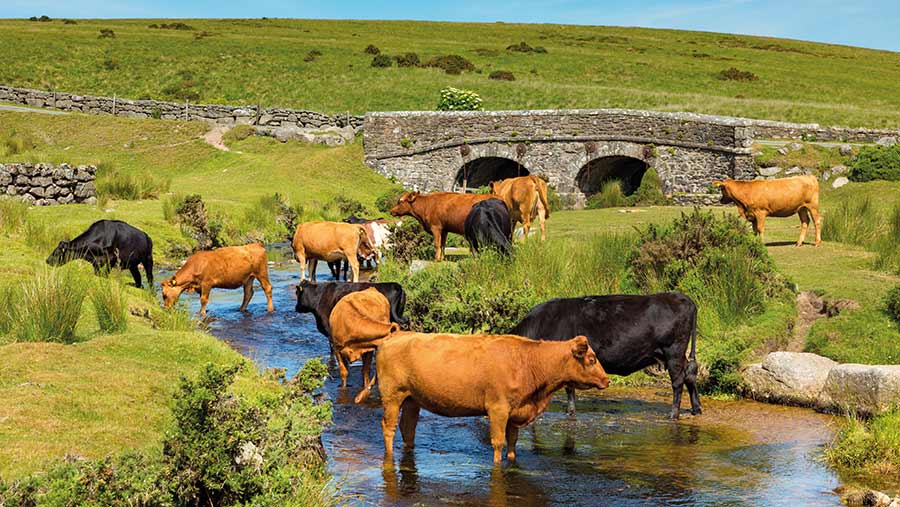2023: What made the farming news in March and April?
Our review of 2023 in agricultural events continues with a look at March and April, when food shortages, mass meat fraud, funding promises, potential land restrictions, a lift on the avian flu housing ban and drought warnings were all hot topics.
See also: Exclusive: Mass food fraud and safety scandal engulfs sector
March

© David Simonds
Empty supermarket shelves hit the public consciousness, with a shortage of fruit and veg compounding what had already been seen in the egg sector.
The supermarkets blamed poor harvests in Spain and North Africa. British Growers Association blamed the lack of government support and inadequate returns from retailers.
The Ulster Farmers’ Union welcomed the so-called Windsor Framework – an agreement between Westminster and Brussels, which would free up post-Brexit trade between
Great Britain and Northern Ireland. A new “trusted trader” arrangement was expected to ease deliveries of things like seed potatoes, veterinary medicines and plant protection products.
Welsh farmers welcomed news that water company Severn Trent was to pay them for planting more trees. Plans for a new milk processing plant in Pembrokeshire also went down well.
Less good was the announcement that the popular Young People’s Village at the Royal Welsh Show was to be scrapped, though a new family arena would replace it.
The farming community bade farewell to charismatic dairy analyst Ian Potter.
Two poachers were fined and banned from keeping dogs under new legal powers.
Viewers of Clarkson’s Farm 2 raised £24,000 for Rebecca Poole – a dairy farmer whose struggle with bovine TB was featured on the show. Most of the money was given to the Royal Agricultural Benevolent Institution.
The Welsh government said it was going to ramp up its TB testing programme.
Bovine spongiform encephalopathy was found in a 17-year-old suckler cow in Cornwall – the first case in the UK since 2021.
Tractor registrations peaked at 2,223 for the month – the highest monthly total since 2009.
An investigation by Farmers Weekly uncovered mass food fraud in the meat supply chain.
The company at the centre of the allegations could not be named for legal reasons, but our report found that a meat processor had been passing off huge amounts of foreign pork as British.
Factory workers also pointed to the regular washing of contaminated meat, the defrosting of frozen meat on the factory floor, and the mixing of rotting meat with fresh produce. Much of this was sold to major supermarkets and food service outlets.
Concerns were expressed about how easily factory inspectors were duped, and the Food Standards Agency was criticised for its “sluggish” response.
The factory in question was shut down. Farmers Weekly launched a new campaign – Meat: Our Expectations – designed to stamp out future criminality.
April

Natural England’s plans to impose grazing restrictions on Dartmoor sparked uproar among farmers © Worldimage/Adobe Stock
Farmers Weekly’s Meat: Our Expectations campaign included four key demands:
- To establish a free whistleblowing line at meat processors
- To set up independent checks on the volume of meat going in and out of factories
- To impose a swifter start to meat plant inspections
- To introduce digital record-keeping.
The plans were welcomed by the meat supply chain.
Welsh red meat levies to fund Hybu Cig Cymru (Meat Promotion Wales) increased for the first time in 12 years, while Defra announced a £44m fund to build new farm reservoirs and upgrade slurry infrastructure.
It also promised future regulation to secure fairer contracts for pig producers.
Edinburgh University students voted to keep meat and dairy products on their campus menus, a move that was described as a “victory for common sense” by Scottish Conservatives.
A planned strike by 150 workers at ABN feed mills was called off as trade union Unite reached a 13% pay settlement, spread over two years, with parent company AB Agri.
Research by Farmers Weekly showed that almost a third of all food producers had cut back output in response to rising energy costs, led by pig and poultry producers, potato growers and horticulturalists.
Just 18% said they had shopped around and secured a better energy deal.
Natural England revealed plans to introduce 30 new protected areas – either sites of special scientific interest or areas of outstanding natural beauty – raising fears of further restrictions on farmers.
It was also found to be pressing ahead with plans to make its tenants on Dartmoor cut back livestock numbers, without any consultation. Defra farming minister Mark Spencer called for an independent review.
Defra lifted its avian flu housing order in England, enabling free-range birds to go outside for the first time in more than five months.
A small herd of beef cattle, stolen in Anglesey in December, was found on two farms in Staffordshire.
A 14-year-old from Orkney sold his British Blue heifer for £6,100, topping his local auction mart record.
And in Norfolk, a Texel ewe gave birth to twins – eight days after having produced a single.
The National Drought Group warned farmers to start making preparations for a possible summer drought.
Herefordshire farmer John Price was handed a 12-month jail sentence for his unauthorised works on the River Lugg. He vowed to appeal.
